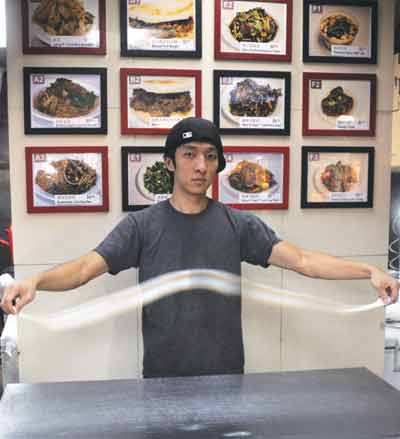Cover Story
Chinese street food gains flavor in US
Updated: 2011-02-04 09:54
By Zhang Yuwei (China Daily US edition)
|
 Jason Wang shows off his hand-pulled noodles skills. [Photo provided by Xi'an Famous Foods] |
An immigrant from Xi'an is paving the way to get authentic Chinese cuisine to New Yorkers
NEW YORK - Forget kung pao chicken or chow-mein with beef and broccoli. New Yorkers are embracing authentic Chinese cuisines from savory cumin lamb Chinese burger to hand-pulled noodles in spicy soup - both dishes from Xi'an, Shaanxi province in Northwest China.
Thanks to David Shi (often called Liangpi, which in English means cold skin noodles, a local street-style foods in Xi'an) who had the vision of selling Chinese street food, he opened the first Xi'an Famous Foods in Flushing, Queens, in 2004.
"We started as a two-people team - myself and a chef back then - using my savings," he said.
"But one thing I was sure was that Xi'an local dishes will gain popularity among Americans.
"Authentic local Chinese food is the missing part in the bigger picture of the food culture in the US."
Shi has now been joined by his son Jason Wang (often called Little Liangpi, or Xiao Liangpi), an economics graduate of Washington University in St Louis, to run four food outlets in New York, including two in Flushing and two in Manhattan, employing a dozen workers.
All locations are tiny and have limited seating. And none takes reservations or even do home deliveries. But the hole-in-the-wall stores attract Chinese and Americans willing to queue to get the delicious food.
"Anytime I find myself in a location where a store is nearby I inevitably end up buying some food," James Lopez, a regular customer of the store in the East Village, said. "You just cannot beat the combination of low prices and great taste."
Chinese cuisine has been part of the US culinary landscape, but most restaurants serve dishes that are "American Chinese cuisine" - typically catering to Western or American tastes and differing significantly from authentic Chinese food. Many feature flavors such as sweet and sour sauce or black bean sauce.
Dishes sold in Shi's place break the stereotype: Mostly street-style foods typically found in Xi'an, a place well known in China for street snack foods. Best-selling dishes in Xi'an Famous Foods include cold skin noodles, savory cumin lamb hand-pulled noodles, and pork and lamb burgers. All sell for less than $7.
Sam Sifton, restaurant critic of The New York Times, said the trend of trying authentic Chinese food started in New York a long time ago, when Sichuan restaurants (and a few Hunan ones) started.
"Fake Cantonese ones that became chop-suey and sweet-and-sour American-style Chinese restaurants used to be all you could find in America," said Sifton, who discovered Xi'an Famous Foods in Flushing a couple of years ago and is now a regular.
Wang Dinggen, an executive chef at Legend, a Sichuan restaurant in lower Manhattan, said that Chinese restaurants are now trying to present more authentic tastes to Americans.
"With more Americans traveling to China more frequently, local Chinese dishes (like Sichuan food) have to be authentic in the US," said Wang, who has 38 years of experience as a chef.
Shi, who is in his 50s, came to the US as a child from Xi'an, one of the oldest cities in China. After more than 15 years in the restaurant business, Shi decided to introduce Xi'an food to New York, using an age-old family recipe.
"My grandfather had his local food stall in Xi'an but it was a long time ago," he said.
"We had the family recipe though so I thought it was time we started something here in the US."
Shi began by trying to make Xi'an dishes such as cold skin noodles and hand-pulled noodles in traditional sauces (which are spicy and sour based), for his American friends, using their feedback for "improvements or innovations".
"Our secret is the mixed sauce and it's the family recipe from my grandfather with some innovations," Shi said.
The base of the sauce is mainly spicy and sour flavors but with innovative secret mixes combining spices from other cuisines - Italian, French and Mexican. Shi and Wang try to combine traditional street-food style with some contemporary elements.
"It's like an art - a little touch of different spices can make a big difference," Shi said.
Wang agrees. He said some ingredients in the US complement the flavor of Chinese traditional sauces, such as the Sichuan red/chili oil sauce.
"It makes the sauce used in cold appetizers more appealing if we add Thai, Indian or Korean oil," he said.
And the dishes have an easy connection with Americans. Sifton said the food is "more familiar to us than you think".
"The lamb sandwich may have 'authentic, local' taste for some Chinese, but it's also familiar to Americans as a form of hamburger," he said.
"We thrill to that, to the English-muffin-style bread, and to the loose, packable meat, fiery and rich."
Hagan Blount, a food adventurer and blogger from Las Vegas, thinks that it is the trend in general for Americans to explore different foreign cuisines.
"Everyone wants to have new and exciting experiences - one way to get that hunger for adventure satisfied is by exploring new cuisine," he said. "The more people know, the less they are afraid."
Blount likes the spice and the hand-pulled wheat flour noodles most. "Most Chinese places in America use rice flour noodles, so these noodles are special," he said.
Shi and Wang train the cooks in all locations to make the hand-pulled noodles. "It is a skill. The noodles must be chewy, crispy and they are healthy. They are made of wheat flour, with absolutely no additives," Shi said.
Shi takes care of most of the procurement while Wang, with great skills in business and computer, manages the marketing. Both also work at the outlets, taking on different roles at the counter or in the kitchen.
Wang, 22, has a very strategic way of running the restaurants and persuaded his father to give up the idea of adding items such as fried rice and egg rolls to diversify the menu.
"We should focus on what we are good at," Wang said. "There's no need to add extra stuff which complicates our menu."
Sifton thinks the biggest difference between Xi'an Famous Foods and other Chinese restaurants in New York is that "it welcomes Americans without changing the food".
"There are no compromises in the cuisine. No egg rolls and sesame chicken for white dudes, and another 'real' menu for Chinese," he said.
Apart from tons of reviews from magazines and newspapers, the food has attracted several food critics and TV personalities including Anthony Bourdain, Andrew Zimmern and Kelly Choi.
Blount said one reason why Xi'an Famous Foods resonates with Americans is the visits from Bourdain.
Time Out New York named it one of the best Chinese restaurants in New York. Most recently, it was featured on NY1 News as the most recommended Chinese restaurant for the Chinese New Year's holiday.
Aside from the secret recipes, there is also the management strategy devised by Wang, who gave up his job at Target to join his father.
Wang persuaded his father to continue the simple street-food style by not making their outlets into restaurants with large dining areas. The decoration of the outlets, he says, should be simple and with just a little touch of Chinese elements, like the red color.
"No delivery, no reservation, and no seating before you order (due to the small size of the outlets with no more than 10 people seating)," Wang said. "If our food is good, these all won't matter."
Sifton thinks it's a "cool business model".
"The tiny stores mean low overheads. No delivery means a small and simple menu. People come to them," he said.
Blount said this model particularly suits small food businesses in New York City. "NYC is all about sales per square foot, so if you have a small space and sell the heck out of a product, you're going to do just fine," he said.
Shi said this is just the start. "We are going to expand and we have some big ideas lined up."
Specials

Spring Festival
The Spring Festival is the most important traditional festival for family reunions.

Top 10
A summary of the major events both inside and outside China.

A role model
Alimjan Halik had been selected as the "Cyberspace Personality Who Moved the Hearts of the Chinese in 2010".